Género e inclusión
El género, la edad, las capacidades y otras características individuales o específicas del contexto presentan diferentes oportunidades y retos para proporcionar PTM a las personas en crisis de forma digna.
Los agentes humanitarios reconocen cada vez más las necesidades y limitaciones específicas de las personas con capacidades diferentes, las personas mayores, las personas de distinto sexo, en particular las mujeres, y las personas en movimiento. Paralelamente, se aprecia cada vez más la necesidad de adoptar medidas adaptadas y sensibles que garanticen su inclusión efectiva.
Apoyar las necesidades de las diversas personas con PTM va más allá de convertirlas en un grupo objetivo; se trata de un compromiso significativo, un diseño y una implementación intencionados, y un ajuste del programa para satisfacer las necesidades de los diferentes grupos con dignidad. Los enfoques inclusivos van de la mano de la ayuda centrada en las personas.
Prioridades actuales
La CALP Network seguirá animando a los actores de los programas de transferencias monetarias a que amplíen su enfoque para ser más inclusivos y defiendan una comprensión más completa de cómo los PTM pueden ir más allá de la noción de “no hacer daño” para abordar adecuadamente las necesidades de personas diversas de manera segura y digna.
Trabajaremos para elevar las experiencias e iniciativas sobre PTM y género, PTM inclusivos de la discapacidad, trabajando con diferentes etnias e identidades culturales, grupos minoritarios, personas con diversas identidades sexuales y grupos de edad.
CALP también se esforzará por hacer su trabajo lo más accesible posible.
Contenido destacado

La CALP Network & CARE: Módulo sobre los Programas de Transferencias Monetarias (PTM) y Género
Blog Post
Este video ofrece una visión general de la relación entre el género y los programas de transferencias monetarias (PTM) estructurada en torno al ciclo del proyecto humanitario, que incluye: Evaluación y análisis de la respuesta: cómo ajustar los procesos de evaluación para lograr un reflejo más preciso del género y los mercados. Diseño y ejecución: cómo utilizar métodos y...

Presentación: Módulo sobre Programas de Transferencias Monetarias (PTM) y Género
Presentación
Esta presentación de diapositivas es parte del primer vídeo de micro aprendizaje de CALP Network en español, realizado en colaboración con CARE. Este módulo de micro aprendizaje ofrece un panorama general de la relación entre el género y los Programas de Transferencias Monetarias (PTM) organizado en torno al ciclo de proyecto humanitario, y forma parte del curso en línea en español de...
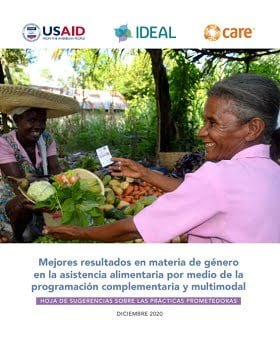
Mejores resultados en materia de género en la asistencia alimentaria por medio de la programación complementaria y multimodal: hoja de sugerencias sobre las prácticas prometedoras
Guía y herramientas
Esta hoja de sugerencias es un extracto del informe de investigación «Mejores resultados en materia de género en la asistencia alimentaria por medio de la programación complementaria y multimodal». Con el estudio, se intentó responder a la pregunta «¿De qué manera los procesos de diseño, implementación y supervisión de proyectos mediante el uso de modalidades combinadas mejoran los...
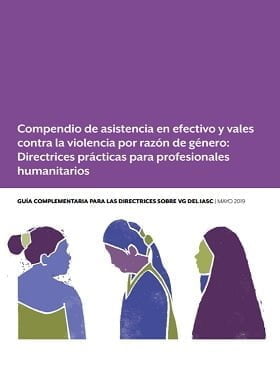
Compendio de asistencia en efectivo y vales contra la violencia por razón de género: Directrices prácticas para profesionales humanitarios
Guía y herramientas
El propósito de este compendio de asistencia en efectivo y vales (AEV) y violencia por razón de género (VG) es ayudar a los actores humanitarios y a las comunidades afectadas por crisis y violencia a: integrar la mitigación de riesgos de VG en las intervenciones AEV; integrar la prevención de VG en la programación multisectorial usando AEV cuando corresponda; integrar la AEV en la...

Programación de Transferencias Monetarias Que Funciona Para Mujeres: 6 Lecciones del Terreno
Informe
En la actualidad, la Programación de Transferencias Monetarías que funciona para mujeres (PTM) es una herramienta común entre las acciones humanitarias y se usa para satisfacer las diversas necesidades de las personas desplazadas por crisis y conflictos con mayor dignidad.1 Aunque existe evidencia cada vez mayor sobre el efecto de la PTM en el bienestar y el poder de las mujeres2, en la...
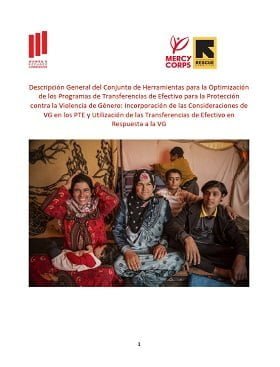
Conjunto de Herramientas para la Optimización de los Programas de Transferencias de Efectivo para la Protección contra la Violencia de Género
Guía y herramientas
De 2016 a 2018, la Comisión de Mujeres Refugiadas (WRC) emprendió un proyecto para desarrollar la capacidad que los actores humanitarios tienen para integrar la protección en los Programas de Transferencias de Efectivo (PTE) y para utilizar los PTE para los resultados de protección, específicamente la protección contra la Violencia de Género (VG). El proyecto, “Optimización de los...
Últimos recursos

Introductory Research on the Feasibility of Cash and Voucher Assistance in Rural Fiji
Report
This report presents the findings of a study into the general feasibility of using Cash and Voucher Assistance (CVA) in responding to disasters in Fiji. The term “Cash and Voucher Assistance” or CVA, is used in the report in line with the the CALP Network definition, so it refers to programs where...

Guide to Cash and Voucher Assistance and Gender-based Violence Resources
Guidelines and Tools
This one-page guide helps practitioners understand how three complementary resources support the integration of CVA and GBV prevention, mitigation and response to strengthen humanitarian response. It aims to help users make decisions on when to use each resource at different stages of work and compares:

Feasibility Study on Cash Transfer Programming for the Returnees and the Host Communities in Gedeo and West Guji in Ethiopia
Report
This document reveals the outcome of a feasibility study on cash transfer programming targeted for the returnees and the host communities in Gedeo and West Guji Zones.
The major objectives of the study were as follows:
1. Understand general cash transfer environment in Ethiopia
2. Validate the needs of...

The potential of Cash and Voucher Assistance to empower women and reduce violence evidence
Report
On April 29 and 30th in Washington DC, CARE and UNWOMEN, on behalf of the gender and cash sub-workstream of the Grand Bargain, convened a workshop with the objectives of:
• Sharing and exchanging existing knowledge, experiences, and good practices;
• Exploring and prioritizing research gaps on cash...

The Digital Lives of Refugees: How displaced populations use mobile phones and what gets in the way
Report
GSMA in partnership with UNHCR conducted quantitative surveys and qualitative research to understand the ways in which refugees are using mobile phones in order to help guide digital interventions by humanitarian organisations and mobile network operators. The research identifies key trends, statistics,...

Can cash transfers in humanitarian contexts help prevent, mitigate, and respond to gender-based violence? A review of the evidence
Report
Today, approximately 10 percent of humanitarian assistance globally is delivered via cash transfer programming (CTP) and cash is increasingly being scaled across the humanitarian system. Yet the use of cash within the protection sector trails behind the use of cash in all other sectors. Refugee and...

Minimum Expenditure Basket Harmonization Guidance
Guidelines and Tools
The present Minimum Expenditure (MEB) Guidance is an operational tool for the Refugee Response to inform humanitarian multi sector and/or multipurpose cash assistance to meet food needs and a broader set of essential needs of refugees in Uganda.

Bridging the Mobile Gender Gap for Refugees
Report
Mobile phones have become an increasingly powerful tool with which to deliver life-enhancing information, services, and opportunities to millions who have not been able to access them before. This case study analyses data from two refugee contexts in East Africa to understand the degree to which women are...
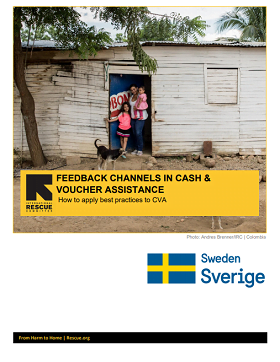
Feedback Channels in Cash and Voucher Assistance: How to Apply Best Practices to CVA
Guidelines and Tools
Accountability is at the core of effective humanitarian programming, and it is our duty to ensure that all programs – including those that use CVA to meet outcomes – are responsive to the clients we serve. While CVA is not inherently more risky than other forms of assistance, there are specific...

CVA for Protection: A Mapping of IRC’s Use of Cash and Voucher Assistance to Help Achieve Protection Outcomes
Guidelines and Tools
The IRC first began to integrate cash into protection programs in 2013, leveraging the flexibility of CVA to support clients living in urban refugee contexts in the Middle East. Since then, IRC has rapidly expanded its use of CVA to help achieve protection outcomes. This scale-up has come with important...
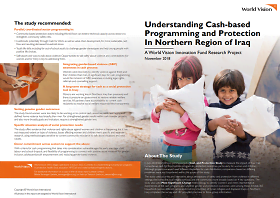
Understanding Cash-Based Programming & Protection in the Northern Region of Iraq-KRI
Report
Cash and Protection Study on impact of CVA (food security focus) on protection outcomes, particularly for women and children.
The study used a survey and interviews about perceptions of safety and protection from violence in different settings: the home, the local neighbourhood, and the community more...
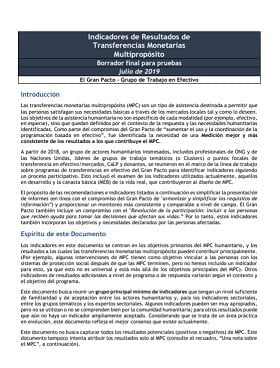
Indicadores de Resultados de Transferencias Monetarias Multipropósito – Borrador final para pruebas
Guía y herramientas
Las transferencias monetarias multipropósito (MPC) son un tipo de asistencia destinada a permitir que las personas satisfagan sus necesidades básicas a través de los mercados locales tal y como lo deseen. Los objetivos de la asistencia humanitaria no son específicos de cada modalidad (por ejemplo,...

Reflections and recommendations from evaluations of the 2017 CVA Somalia Drought Response
Report
Improving our response to drought to avert crises through the use of cash and voucher assistance requires us to build on experience. This paper pulls together reflections and recommendations from a review of eight evaluation reports, reviews and studies that were conducted during or after the 2017 drought...
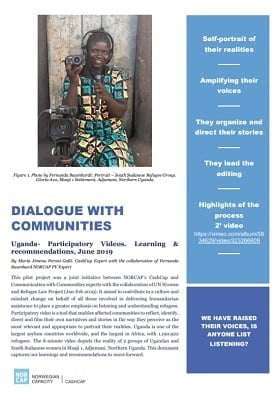
Learning from the Participatory Video in Uganda
Report
Brief lessons learned document of our journey using Participatory Videos (PV) in Uganda. We asked ourselves key questions, and share some tips. What inspired us? Why PV? With PV you take the backseat, are we prepared? What was the role of CashCap & partners? Bottom-up or business as usual? We have raised...
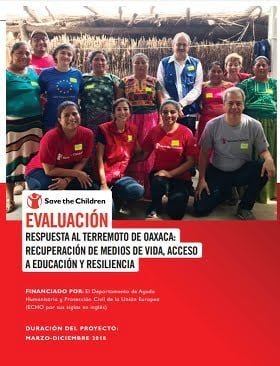
Evaluación Respuesta al Terremoto de Oaxaca: Recuperación de Medios de Vida, Acceso a Educación y Resiliencia
Informe
En el mes de septiembre de 2017 se desarrollaron 3 terremotos que afectaron 10 estados de México (50 millones de personas). Entre ellos, Oaxaca y Chiapas, 2 de los estados más pobres del país, fueron los más afectados, con más de 300,000 personas y al menos 96,000 fueron niños y niñas, sufrieron...
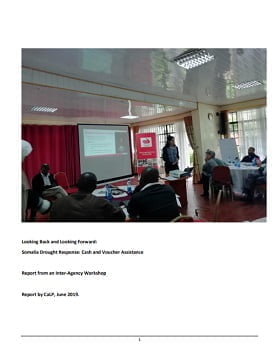
Looking Back and Looking Forward: Somalia Drought Response: Cash and Voucher Assistance
Case Study
This report summarizes the discussions that took place during a one-day learning event on 11th June 2019. The event brought together 27 people from national and international NGOs, the UN, and donors to discuss progress, reflect on cash and voucher (CVA) assistance in Somalia and identify priorities for...
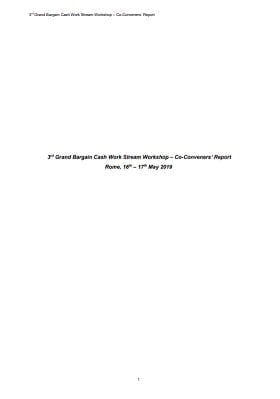
3rd Grand Bargain Cash Work Stream Workshop – Co-Conveners’ Report
Report
The third Grand Bargain (GB) Cash work stream Workshop was held at WFP Headquarters in Rome on 16th-17th May 2019, hosted by WFP and DFID. Over 85 participants attended the workshop, representing 60 donor and humanitarian organisations and multilateral agencies, and including representatives from the...
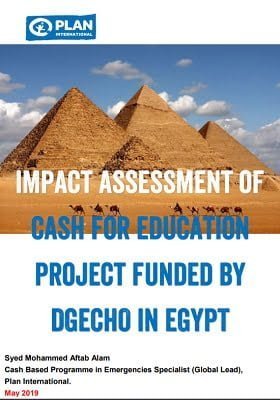
Impact Assessment for Cash for Education Project funded by DGECHO in Egypt
Report
The overall objectives of the Impact assessment were: To measure the impact of cash on the girls and boys by DGECHO funded project. To measure the impact of cash on Education and protection through a gender lens to investigate considerations of power dynamics in the households Understand the good...

Cash for Work (CFW) Guidance Note
Guidelines and Tools
Cash for Work interventions provide employment to unskilled and semi-skilled workers on labour intensive projects such as rehabilitation of irrigation systems, soil conservation, and road construction and maintenance.
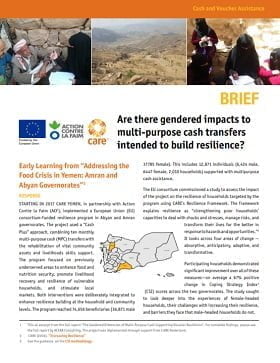
Are there gendered impacts to multi-purpose cash transfers intended to build resilience?
Report
Brief from full report “The Gendered Dimension of Multi-Purpose Cash Supporting Disaster Resilience” extracting the specific gendered findings from a study on the impact of an EU funded project that used a “Cash Plus” approach, combining ten monthly multi-purpose cash (MPC) transfers with the...


